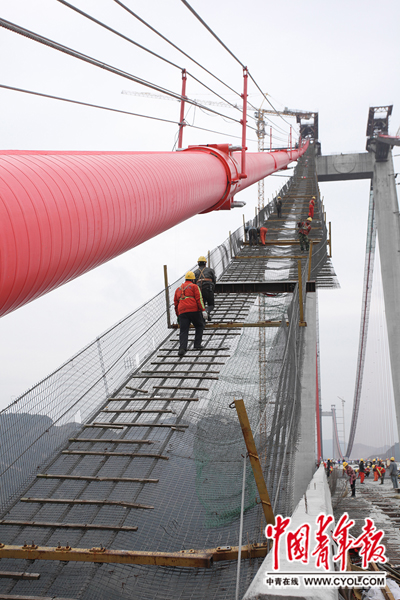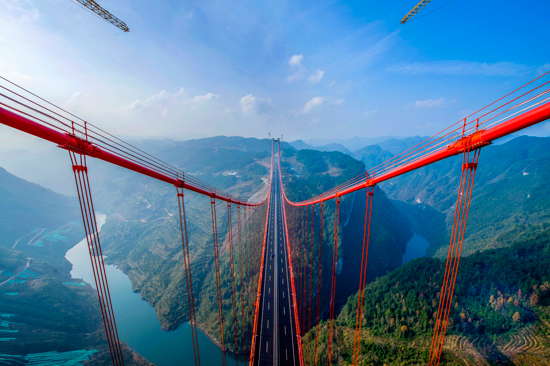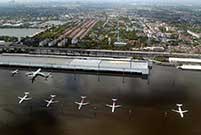


Workers on the Qingshuihe Bridge. (Bai Hao/China Youth Daily)

Qingshuihe Bridge in southwest China's Guizhou province. (Bai Hao/China Youth Daily)
"This is the second highest bridge in the world, with a depth of 406 meters and a length of 2,171 meters," said Zhang Mingshan, chief engineer of the Qingshuihe Bridge in southwest China's Guizhou province.
Zhang, born in 1980, graduated from the Department of Civil Engineering of Northeastern University in 2005. He never expected that he would be in charge of building the second highest bridge in the world. For the past two years, Zhang and his colleagues have worked day and night in the rolling mountains of Guizhou to overcome the most difficult problems, one after another, in the history of bridge construction.
On Dec. 31, 2015, the Qingshuihe Bridge was officially put into operation, one full year ahead of schedule. With that, all 88 cities and counties in Guizhou province were linked by highways.
A foreign netizen jokingly commented that if it were his country in charge of the project, they would probably spend ten years on discussion, another five on planning, and five more on construction. He also speculated that the final cost would be four times the budget.
In addition to being the world’s second highest bridge, Qingshuihe Bridge is also the world's largest single-span plate truss stiffening girder suspension bridge, and Asia's first steel truss girder suspension bridge built in a mountainous area.
People may not fully understand such engineering jargon, but Zhang and his colleagues know that, behind the industry expressions, the technical team spent countless hours on discussion, experiments and calculations. "It is the creativity of every team member that supports the bridge," said Zhang.
The article is edited and translated from《世界第二高桥 中国智造》. Source: China Youth Daily.
 Getting close to the crew on China's aircraft carrier
Getting close to the crew on China's aircraft carrier A beauty's dancing youth
A beauty's dancing youth Chinese stewardess celebrate test flight at Nansha Islands
Chinese stewardess celebrate test flight at Nansha Islands "Rent me as your girlfriend!"
"Rent me as your girlfriend!" World's first 'underwater skyscraper'
World's first 'underwater skyscraper'  Top 10 weapons in the world in 2015
Top 10 weapons in the world in 2015 Are these the world’s scariest landing strips?
Are these the world’s scariest landing strips? In pics: Left behind children in China
In pics: Left behind children in China Eight modern day engineering marvels of China
Eight modern day engineering marvels of China Top 20 hottest women in the world in 2014
Top 20 hottest women in the world in 2014 Top 10 hardest languages to learn
Top 10 hardest languages to learn 10 Chinese female stars with most beautiful faces
10 Chinese female stars with most beautiful faces China’s Top 10 Unique Bridges, Highways and Roads
China’s Top 10 Unique Bridges, Highways and Roads Crumbling Great Wall
Crumbling Great Wall Single, lonely expats share their stories
Single, lonely expats share their stories Will Taiwan vote sway cross-Straits peace
Will Taiwan vote sway cross-Straits peace Female criminals evade jail time for being mothers
Female criminals evade jail time for being mothersDay|Week